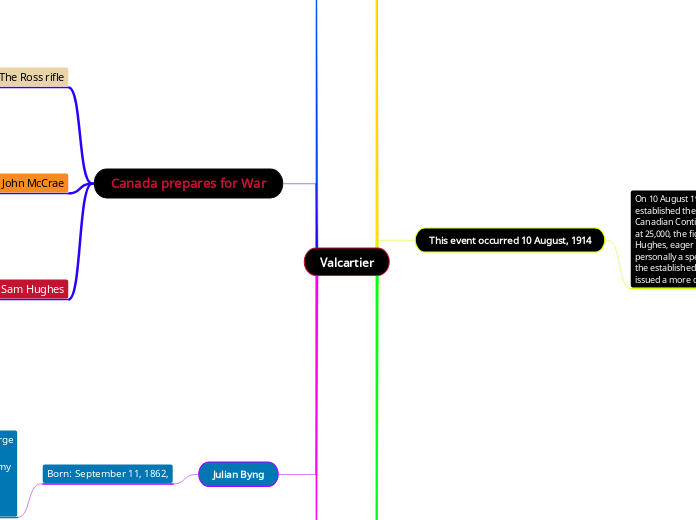Valcartier
Robert Borden
Sir Robert Laird Borden GCMG PC KC (June 26, 1854 – June 10, 1937) was a Canadian lawyer and politician who served as the eighth prime minister of Canada, in office from 1911 to 1920. He is best known for his leadership of Canada during World War I.
Borden was born in Grand-Pré, Nova Scotia. He worked as a schoolteacher for a period and then served his articles of clerkship at a Halifax law firm. He was called to the bar in 1878, and soon became one of Nova Scotia's most prominent barristers. Borden was elected to the House of Commons of Canada in 1896, representing the Conservative Party. He replaced Charles Tupper as party leader in 1901, and became prime minister after the party's victory at the 1911 federal election.
https://en.wikipedia.org/wiki/Robert_Borden
1:57
Julian Byng
Born: September 11, 1862,
Field Marshal Julian Hedworth George Byng, 1st Viscount Byng of Vimy, GCB, GCMG, MVO was a British Army officer who served as Governor General of Canada, the 12th since Canadian Confederation
Canada prepares for War
Sam Hughes
He became prime minister from 1911 to 1916
Sir Samuel Hughes, KCB PC was the Canadian Minister of Militia and Defence during World War I. He was notable for being the last Liberal-Conservative cabinet minister, until he was dismissed from his cabinet post.
John McCrae
John McCrae (November 30, 1872 January 28, 1918) .
John McCrae was a Canadian poet, physician, author, artist and soldier during World War I, and a surgeon during the second battle of Ypres, in Belgium. He is know for writing war poems. He died from pneumonia near the end of the war.
The Ross rifle
The Ross rifle is a straight-pull bolt action .303 inch-calibre rifle that was produced in Canada from 1903 until 1918.
The Ross rifle was highly successful in target shooting before WWI, but the close chamber tolerances, lack of primary extraction and overall length. The gun was still used by snipers in the war; it just wasn’t a good gun for close up gun fights.
Nellie McClung
Nellie Letitia McClung, née Mooney, suffragist, reformer, legislator, author (born 20 October 1873 in Chatsworth, ON; died 1 September 1951 in Victoria, BC).
Nellie McClung was raised on a homestead in the Souris Valley, Manitoba, from 1880 and did not attend school until she was 10. She received a teaching certificate at 16 and then taught school until she married Robert Wesley McClung in 1896. In Manitou, Manitoba, where her husband was a druggist, she became prominent in the Woman's Christian Temperance Union, of which her mother-in-law was provincial president. In 1908 McClung published her first novel, Sowing Seeds in Danny, a witty portrayal of a small western town. It was a national best-seller and was followed by numerous short stories and articles in Canadian and American magazines.
Main topic
Billy Bishop
William Avery Bishop, VC, CB, DSO & Bar, MC, DFC, ED (8 February 1894 – 11 September 1956) was a Canadian flying ace of the First World War.
In November 1916 after receiving his wings, Bishop was attached to No. 37 Squadron RFC at Sutton's Farm, Essex, flying the BE.2c. He was officially appointed to flying officer duties on 8 December 1916.[30] Bishop disliked flying at night over London, searching for German airships, and he soon requested a transfer to France
https://en.wikipedia.org/wiki/Billy_Bishop
3:01
Arthur Currie
He was made the commander of the Canadian corps in 1917.
Currie began his military career in 1897 as a part-time soldier in the Canadian militia while making his living as a teacher and later as an insurance salesman and real estate speculator. Currie rose quickly through the ranks: commissioned as an officer in 1900, promoted to captain in 1901, then major in 1906 and became an artillery regimental commander in 1909. In 1913, Currie accepted the command of the newly created 50th Regiment Gordon Highlanders of Canada
This event occurred 10 August, 1914
On 10 August 1914, the government established the strength of the First Canadian Contingent for overseas service at 25,000, the figure requested by London. Hughes, eager to lead and coordinate personally a speedy call-up, chose to forgo the established mobilization plan and issued a more direct call to arm.
World War One Trench
It occured world war 1.
The typical trench system in World War I consisted of a series of two, three, four, or more trench lines running parallel to each other and being at least 1 mile (1.6 km) in depth. Each trench was dug in a type of zigzag so that no enemy, standing at one end, could fire for more than a few yards down its length.
Subtopic
youtube
3:15
Halifax Explosion
Halifax was devastated on 6 December 1917 when two ships collided in the city's harbour, one of them a munitions ship loaded with explosives bound for the battlefields of the First World War.
one of them a munitions ship loaded with explosives bound for the battlefields of the First World War. What followed was one of the largest human-made explosions prior to the detonation of the first atomic bombs in 1945. The north end of Halifax was wiped out by the blast and subsequent tsunami. Nearly 2,000 people died, another 9,000 were maimed or blinded, and more than 25,000 were left without adequate shelter.

